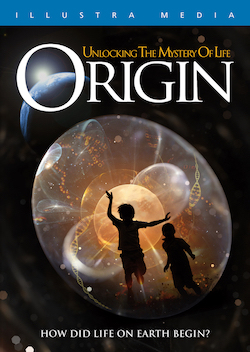 Evolution
Evolution
 Intelligent Design
Intelligent Design
 Life Sciences
Life Sciences
In a New Documentary, Origin, Paul Nelson and Ann Gauger Confront the Enigma of Chemical Evolution
Materialist accounts of origins face a dual challenge — biological evolution and chemical evolution. The latter describes the problem of generating life from nonlife in the hostile environment of the early Earth. To call that problem overwhelming, given the resources of matter and energy alone — in other words, blind churning — doesn’t begin to do it justice. It doesn’t even begin to begin.
 That’s the takeaway from an effective new documentary from Illustra Media, Origin: Design, Chance and the First Life on Earth, featuring Discovery Institute biologist Ann Gauger and philosopher of biology Paul Nelson. Stephen Meyer’s Signature in the Cell is the definitive work on the origin-of-life puzzle and why it points powerfully to intelligent design. But if you’ve got only 45 minutes to devote to perhaps the ultimate question that human beings can ask themselves, then Origin delivers a strong and accessible précis of the argument.
That’s the takeaway from an effective new documentary from Illustra Media, Origin: Design, Chance and the First Life on Earth, featuring Discovery Institute biologist Ann Gauger and philosopher of biology Paul Nelson. Stephen Meyer’s Signature in the Cell is the definitive work on the origin-of-life puzzle and why it points powerfully to intelligent design. But if you’ve got only 45 minutes to devote to perhaps the ultimate question that human beings can ask themselves, then Origin delivers a strong and accessible précis of the argument.
Get it here on DVD. See the trailer above.
The nice thing about chemical evolution is that scientists with no affinity for the design hypothesis admit that the odds against the first life self-assembling are horrendously steep. That’s why they try to push off the problem with “solutions” like panspermia (life from outer space) or the multiverse. These are admissions of defeat. As Dr. Nelson wryly observes, they merely apply misdirection to the enigma, taking refuge in fantastic speculation to avoid the obvious conclusion that life was deliberately assembled on Earth.
Dr. Gauger notes the problem that life as we know it is cellular. The first cell — self-replicating, protected from its environment by a membrane, yet able to communicate with that environment — must have come together at one go. No matter how simple we imagine this cell to have been, there are certain minimal requirements.
Given the most generous assumptions of prebiotic chemistry, the Earth’s 4.6 billion year history is not remotely enough to account for the string of chance happenings that are needed. The numbers involved, which Origin calculates for us, are beyond absurd. The difficulty is that chemistry alone, which is all there could be on the early Earth, lacks the ability to imagine and carry out plans. “Chemistry itself is indifferent to whether anything is alive or dead,” says Paul Nelson.
In a sense, this makes all the other problems with biological evolution, that is, with Darwinism, beside the point. “Natural selection won’t work to make the first cell,” Gauger explains, “because natural selection can’t work on anything unless it’s got some means of inheriting and monitoring change and choosing the best survivor to go forward.”
The precious RNA World hypothesis is a false hope. RNA is a delicate, fragile thing, requiring painstaking laboratory work — trained intelligence, expensive equipment, carefully controlled conditions — to synthesize. In the harsh environment of the fabled “warm little pond,” or the currently favored scenarios involving hydrothermal vents or an expanse of dry, cracked clay, an RNA molecule would be doomed.
Yet materialists insist on such scenarios because they must, having arbitrarily limited themselves to explanations that do without the resource we use in our own experience of creativity — intelligence.
The more you learn about it, the more the fascinating mystery of origins deepens, with intelligent design the only plausible solution. Origin is intended as a sequel to an earlier Illustra production, Unlocking the Mystery of Life. It’s a worthy follow-up that we can imagine enlightening a range of audiences.
